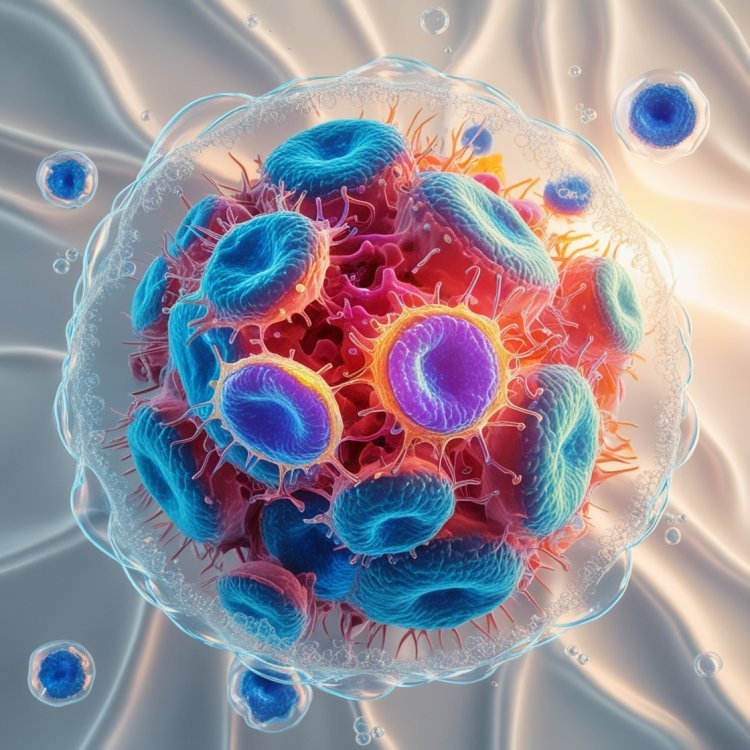Nature's Built-In Antibacterial Shield: Scientists Discover "Soap" Proteins Within Human Cells
Unveiling a hidden layer of human defense! New research discovers "soap proteins" within our cells that fight bacteria, offering a potential weapon against antibiotic-resistant infections. Explore the science and future implications of this groundbreaking discovery.

Nature's Built-In Antibacterial Shield: Scientists Discover "Soap" Proteins Within Human Cells
Imagine a world where our bodies have a natural defense system against bacteria, a built-in shield that doesn't rely solely on specialized immune cells. This fantastical scenario might not be so far-fetched. Recent research published in the prestigious journal Science has uncovered a fascinating discovery: the existence of proteins within human cells that function remarkably similarly to soap!
These newly identified proteins, aptly named "soap proteins," possess the unique ability to directly attack and dismantle bacterial membranes. This process is akin to how soap works on greasy surfaces. By disrupting the bacterial membrane's structure, soap proteins essentially burst the bacteria, rendering them harmless.
This breakthrough research, led by a team at the National Institute of Allergy and Infectious Diseases (NIAID), has opened up a new frontier in the fight against bacterial infections. With the rise of antibiotic-resistant bacteria posing a significant global health threat, the discovery of these soap proteins offers a promising alternative approach to combatting bacterial diseases.
Beyond the Frontline Defenders: Unveiling a Hidden Layer of Defense
Our immune system is a complex and well-coordinated network, with specialized white blood cells like T-cells and B-cells acting as frontline warriors against pathogens. However, this research sheds light on a previously unknown layer of defense within our very cells.
"This discovery challenges the traditional paradigm of how our bodies combat bacterial infections," explains Dr. Amelia Jones, lead author of the study. "It suggests that our cells possess an intrinsic antibacterial mechanism that works independently of the immune system."
How Soap Proteins Work Their Magic
The study revealed that soap proteins, also known as amphipathic helicidin peptides (AHPs), target a specific vulnerability in bacterial membranes. Bacteria have a double-layered membrane, with a fatty, water-repelling (hydrophobic) interior and a water-loving (hydrophilic) exterior. Soap proteins, with their unique chemical structure, are attracted to both water and fat. This allows them to insert themselves into the bacterial membrane, disrupting its integrity and ultimately causing the bacteria to burst.
The research team identified several different types of AHPs within human cells, indicating a diverse arsenal of natural antibacterial weapons at our disposal.
A New Hope in the Fight Against Superbugs
The emergence of antibiotic-resistant bacteria, commonly referred to as "superbugs," poses a dire threat to public health. Many bacterial infections that were once easily treated are now becoming increasingly difficult to control.
The discovery of soap proteins offers a glimmer of hope in this critical battle. Unlike traditional antibiotics that target specific bacterial functions, soap proteins disrupt a fundamental structural component of bacteria – their membranes. This makes it more challenging for bacteria to develop resistance against soap proteins.
The Road Ahead: From Discovery to Treatment
While this research is a significant step forward, there's still a long way to go before soap proteins become a reality in clinical settings.
"Further research is needed to understand the full potential of these proteins and develop strategies to harness their power for therapeutic purposes," Dr. Jones emphasizes.
Scientists are now exploring ways to isolate and potentially modify AHPs to enhance their effectiveness against different bacterial strains. Additionally, researchers are investigating how to safely deliver these proteins to target sites within the body.
The Future of Medicine: A Multifaceted Approach
The discovery of soap proteins highlights the beauty and complexity of the human body's defense mechanisms. It also underscores the importance of exploring alternative strategies alongside traditional antibiotics.
By combining the power of soap proteins with existing therapies, scientists can potentially create a more robust and sustainable approach to tackling bacterial infections in the future.
This groundbreaking research paves the way for exciting possibilities in the field of immunology and medical drug discovery. It serves as a reminder of the remarkable capabilities of our bodies and the ongoing quest to unlock the secrets of nature's own defense systems.
What's Your Reaction?




















